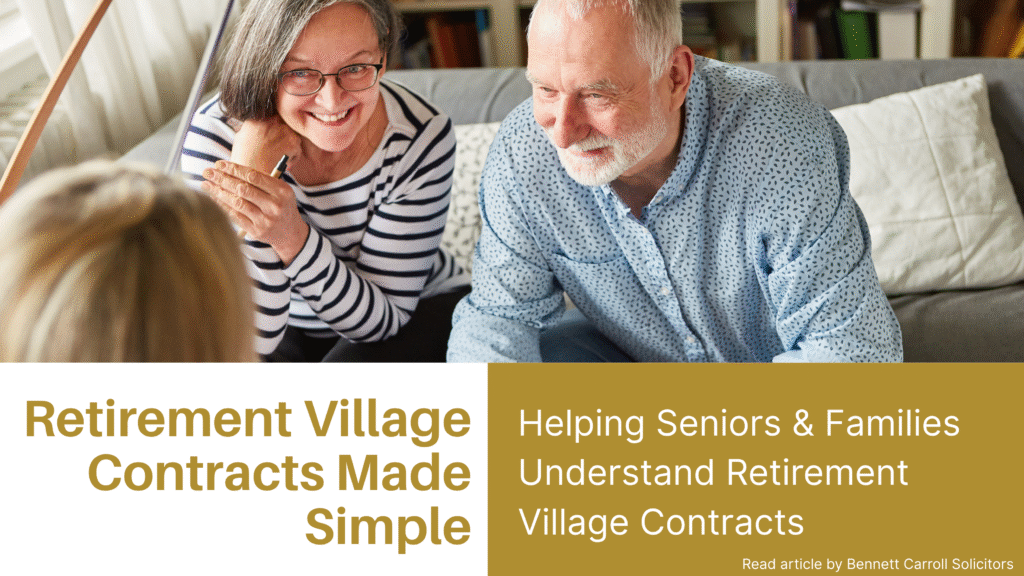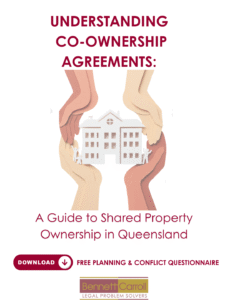Making the move into a retirement village is a major life decision — for both the person moving in and their loved ones. Whether you’re planning ahead for yourself, helping a parent, or acting under an Enduring Power of Attorney (EPOA), it’s important to understand exactly what you’re agreeing to when signing a retirement village contract in Queensland.
At Bennett Carroll Solicitors, we regularly advise clients across Queensland including Brisbane, Stafford, Upper Mount Gravatt, Kawana, Mermaid Beach, and Ipswich on their rights and obligations before entering a retirement village or aged care arrangement.
This article breaks down the key legal points, common questions, and why getting legal advice early can save you time, money, and stress.
What Is a Retirement Village?
A retirement village is a residential community designed for older Queenslanders who want to live independently but with access to shared facilities, services, and support.
Unlike a standard property purchase, when you “buy into” a retirement village you’re not buying the land or unit outright. Instead, you’re entering into a complex legal contract that governs your right to live in the village, what fees you pay, and what happens if you leave or pass away.
Common contract types include:
- Leasehold – you lease the property long-term.
- License to occupy – you pay an ingoing contribution to live there but don’t own the property.
- Freehold – less common, but some villages sell the unit outright.
- Loan or donation arrangements – sometimes structured as interest-free loans or contributions.
Common Questions We’re Asked About Retirement Village Contracts
1. What is included in the contract?
Your contract should clearly explain:
- The type of interest you are buying (e.g. leasehold, license).
- Ingoing contribution (what you pay to enter).
- Recurrent charges (weekly/monthly fees).
- Exit fees or “deferred management fees” (what’s payable when you leave).
- What happens to your ingoing contribution when you leave or pass away.
- Repairs and maintenance responsibilities.
- Village rules and service levels.
2. What are “exit fees” or “deferred management fees”?
This is one of the biggest surprises for many families.
These are fees the operator deducts when you leave the village, usually as a percentage of the ingoing contribution (e.g. 30% over 10 years). It can significantly reduce the amount refunded to you or your estate.
3. Can I make changes to my unit?
This depends on the village rules and your contract. Some allow minor modifications (like handrails or ramps), while others require approval for any changes.
4. What happens if my health changes?
Some contracts include “care options” if you need more support later on. Others may not guarantee a transfer to an aged care facility. It’s critical to know what your options are before you sign.
5. What happens when I pass away?
Your contract will set out how and when funds are repaid to your estate. This can take time and may be affected by resale of the unit. Executors and EPOAs should understand these timelines clearly.
6. What If I Already Own a Home?
A common question we’re asked is: “What happens to my home if I move into a retirement village?”
Every situation is different, but here are some key considerations:
- You can sell your home to fund your ingoing contribution to the retirement village.
- You can keep your home and rent it out or retain it as part of your estate.
- Some people use the proceeds from the sale of their home to invest or support future care needs.
- You should consider Centrelink implications, moving into a retirement village may affect your pension or other benefits.
- If you have a mortgage or jointly owned property, it’s important to understand how this impacts your legal and financial position.
Tip: If you still own a home, it’s wise to speak with both your solicitor and your financial advisor to make sure your move is structured in a way that protects your assets and long-term interests.
If you’re selling a home to move into a retirement village, our conveyancing team can help manage the sale, while our estate planning team ensures your Wills and Powers of Attorney are updated to reflect your new circumstances.
7. What If It’s the Kids or EPOA Organising the Move?
It’s very common for adult children or someone acting under an Enduring Power of Attorney (EPOA) to take the lead in organising the move into a retirement village. This can be an emotional and complicated process.
Some important legal points to keep in mind:
- The EPOA must act in the best interests of the person they represent — not their own.
- If the family home is being sold to fund the move, legal and financial advice is essential to ensure the sale and transfer of funds are properly documented.
- The person moving must still understand and agree to the contract if they have capacity.
- If capacity is an issue, extra legal steps may be needed to ensure the agreement is valid.
- Family members should understand their responsibilities after the move — including ongoing fees, exit entitlements, and estate impacts.
Getting legal advice early can help avoid disputes later, particularly if multiple children or family members are involved in decision-making.
Real-Life Example (Common Scenario)
Example: An elderly parent decides to move into a retirement village. Their adult children help sell the family home to fund the ingoing contribution. The solicitor reviews the retirement village contract, checks the exit fees and refund timelines, updates the parent’s Will and EPOA, and ensures the funds are protected.
Years later, when the parent passes away, the estate is settled smoothly because everything was structured properly at the beginning.
Why Independent Legal Advice Is So Important
Retirement village contracts are very different from a standard residential purchase contract. They’re often long, complex, and heavily weighted in favour of the operator.
Having an experienced solicitor review the contract will help:
- Identify hidden costs or risks.
- Explain your rights in plain language.
- Negotiate or clarify any unclear terms.
- Ensure your estate or attorney understands their responsibilities.
We also often work with children of elderly parents or EPOAs who are helping to manage this transition.
Key Legal Protections in Queensland
The Retirement Villages Act 1999 (Qld) provides some consumer protections, including:
- Pre-contract disclosure: the operator must give you a Public Information Document (PID) or Village Comparison Document.
- Cooling-off period: you have a right to withdraw within a set time after signing.
- Refund rules: clear rules around exit entitlements.
- Operator obligations: standards for maintenance, fees, and services.
However, these protections don’t remove the complexity of the contract — which is why legal advice is still essential.
Common Issues We See
- Unexpected or high exit fees reducing estate payouts.
- Confusion over who is responsible for maintenance.
- Delays in refunds to estates.
- Conflicts between family members and operators.
- People feeling rushed to sign without understanding the terms.
Our Tips Before Signing a Retirement Village Contract
- Get the documents early – don’t sign anything without reviewing the Village Comparison Document and contract carefully.
- Speak to your solicitor before signing – not after.
- Ask about exit fees and refund timelines upfront.
- Clarify future care options if your health changes.
- Ensure your EPOA and Will are up to date before you move.
- Don’t rely on verbal promises — only what’s in writing counts.
Where Bennett Carroll Solicitors Can Help
We provide practical legal support for individuals and families at every stage of the transition to retirement living. Our services include:
- Retirement village contract review and advice
- Conveyancing (including sale of your home if you’re downsizing)
- Estate planning (Wills, Enduring Power of Attorney, Advance Health Directives)
- Estate administration and exit fee considerations
- Dispute resolution with operators or between family members
We can assist clients anywhere in Queensland, and offer:
- In-person appointments at our offices in Brisbane, Stafford, Upper Mount Gravatt, Kawana, Mermaid Beach, and Ipswich
- Local home visits (where practical)
- Fully electronic and online appointments for clients throughout Queensland
Our team is experienced in helping individuals, families, and attorneys navigate these decisions with clarity, confidence, and care.
Related Articles You May Find Helpful
- Understanding Enduring Powers of Attorney in Queensland
- Estate Administration: What Happens When a Loved One Passes Away
Get Legal Advice Early
Entering a retirement village can offer security, community, and peace of mind but only if you fully understand the contract. Don’t let hidden costs or legal fine print create stress down the track.
Contact Bennett Carroll Solicitors for clear, practical legal advice before signing any retirement village agreement.
📍 Offices in Brisbane, Stafford, Upper Mount Gravatt, Kawana, Mermaid Beach, and Ipswich
Email to info@bcglaw.com.au | Free call 1300 334 566 | www.bcglaw.com.au
Local home visits or online appointments available throughout Queensland.








